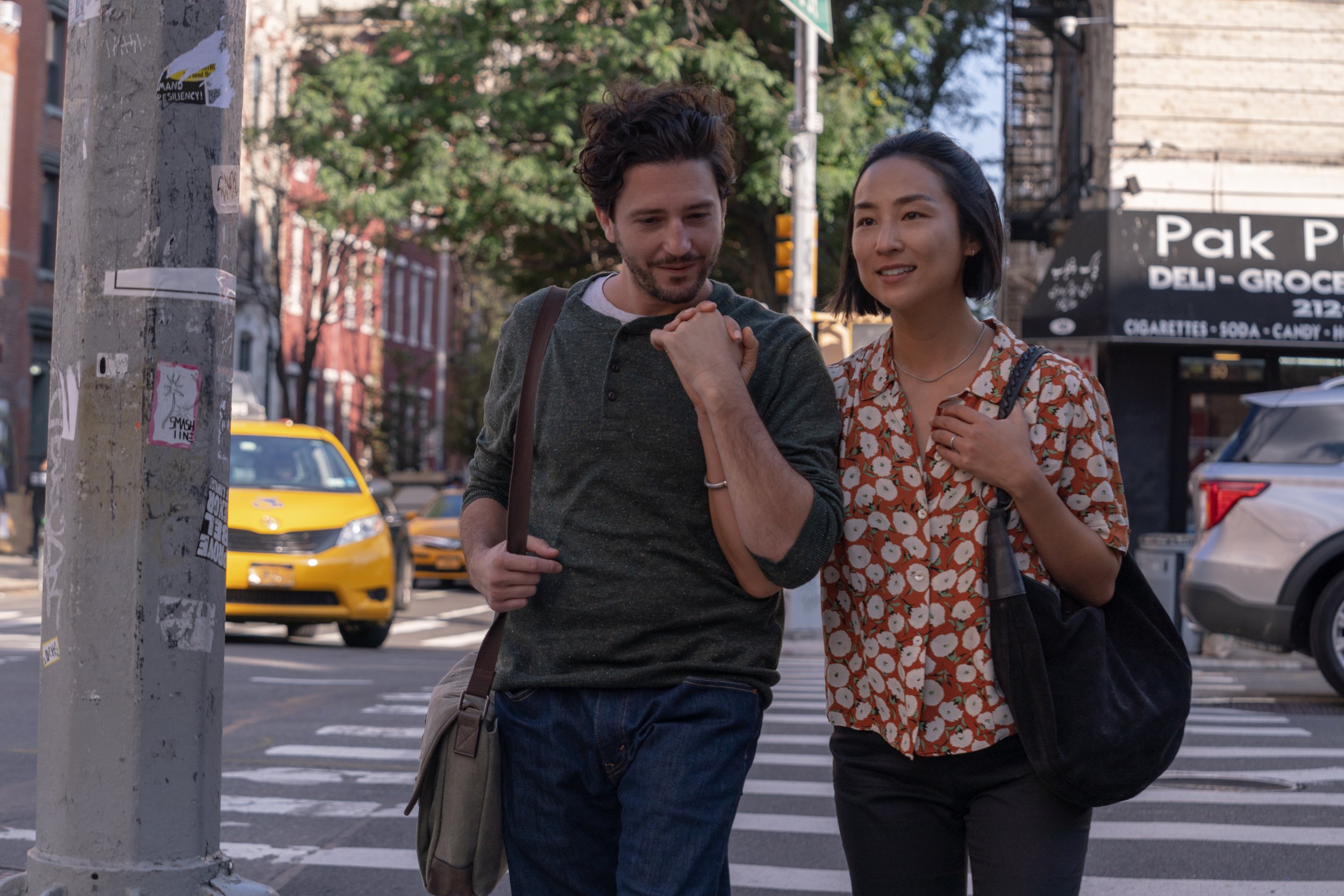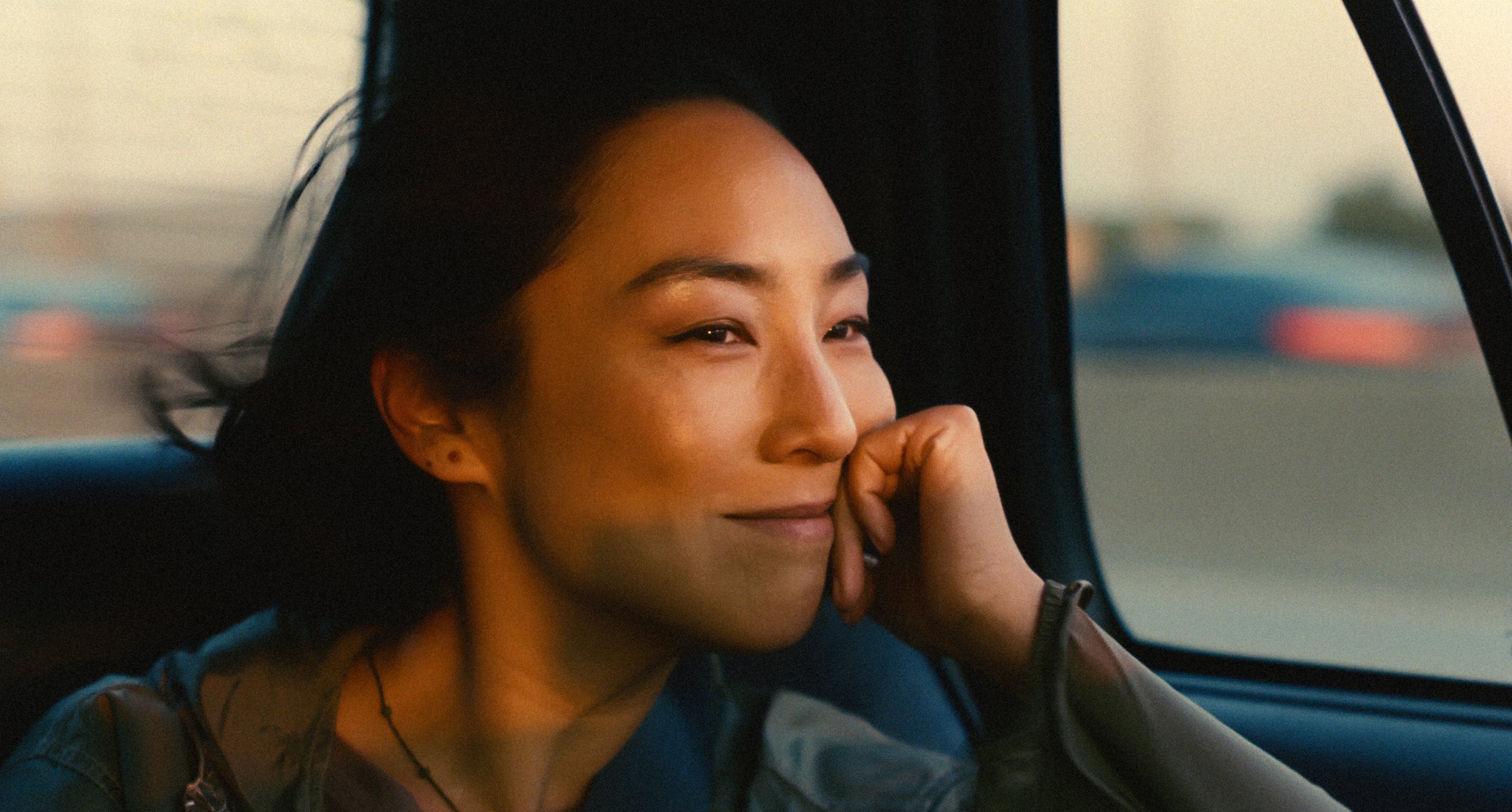In conversation with Greta Lee and John Magaro: stars of ‘Past Lives’
(L-R) John Magaro, Greta Lee // Credit: Jon Pack
Never has a film prompted me to reflect so much on my life’s choices — both ones that I’ve made and ones that were made for me — more than A24’s romantic drama, Past Lives. After attending the screening in New York City, I found myself heavy with unfamiliar melancholy.
Past Lives was written by Celine Song and is based on the true events of her own love life. And you wouldn’t believe it after watching the film but this is Song’s feature directorial debut. The film is about two close childhood friends, Nora (Greta Lee) and Hae Sung (Teo Yoo), who were separated after Nora’s family emigrated from South Korea to Canada. Twelve years later, Nora messages Hae Sung on Facebook after searching for him and discovering that he had been looking for her. The two develop an online relationship before Nora abruptly ends it so that she can focus on her life and emerging career as a playwright in New York City. Fast forward another twelve years, long after Nora marries her husband Arthur (John Magaro), she reunites with Hae Sung for an unforgettable week in NYC as they confront their past, present, and future.
This isn’t your typical American love story. In fact, Past Lives pushes the boundaries of what love stories are expected to be. This story focuses on an immigrant woman who is shaped by the forces of her current life in America and her past life in South Korea. In many ways, Nora is going through the grieving process of losing her younger self and the life that could have been.
While some viewers have critiqued Past Lives for being slow, that’s a lazy misunderstanding of the film’s intentional casting of silence, stillness, and time as supporting characters in the story. Past Lives is patient, kind, complex, and gentle. This film is rich with subtlety and nuance. Immigrants and children of immigrants will especially relate to Past Lives because, at some point, we all wonder how our lives would be different had our families not emigrated.
I had the opportunity to speak with Greta Lee and John Magaro about the film. Here are edited and condensed excerpts from our conversation.
Greta Lee // Credit: Courtesy of A24
The film got me thinking about the immigrant family experience. I hadn’t really thought about this before but there’s this element of loss and grief of what’s left behind and what could have been. Can you talk about that?
Greta: Right away, that is what blew me away reading this script. I had never really seen the truth and complexity of being an American person with this kind of immigrant experience told like this. In a way that isn’t an explanation or one that feeds into some sort of gaze or tries to make it more palatable or understandable. It was all just in service of frankly, a simple story. A simple story that supersedes ideas about immigration or race. It’s not racialized. It’s about love. It’s something that anyone can relate to. Whether you are Korean, whether you are an immigrant, anyone.
I’m just genuinely so thrilled to have had this chance, with this movie, at this point, and it makes me cautiously optimistic for the future. The hope is that this is just going to be the standard. That we will just be able to exist and tell stories. Connect with people without having to constantly shout out our differences.
It seems like we’ve reached a point in Asian representation where we don’t have to introduce the show or films as “Asian.” They are just relatable and universal stories that happen to have Asian characters and actors. Can you share your perspective on that, and do you think change is happening quickly enough?
Greta: No, it’s not changing quickly enough. I think as long as we are still talking about representation as a concept, it proves that we’re not quite there yet. However, that’s something that a lot of people, myself included, have been fighting for aggressively for a long time. Battling the entire notion of what makes an American movie. By being hyper-specific, you can tell a story featuring someone who looks like us at the center of a story and have it be an American film that many people can relate to. I do believe that great storytelling trumps everything — even ideas around racial identity. I feel that the responsibility we have as actors is in service of stories. Until we get there, I don’t know if I’ll feel like we have progressed or that we’ve arrived somewhere.
Tell me more about your idea of “responsibility” as an actor.
Greta: I have such a conflicting relationship with the entire notion of this responsibility. I’m keenly aware, from observation, that most of my peers are completely unburdened by this responsibility. It’s hard sometimes not to feel that it’s a burden and to imagine what it would be like if I were liberated from this responsibility that we’re talking about. And that also doesn’t change the fact that it exists. So much of my career has been learning to love that part of the experience and embracing the pain of that thing that exists within me instead of being in denial about it. Because of certain events in my life, COVID, anti-Asian hate, Black Lives Matter, and that entire summer of our collective racial awakening and reckoning, there was a moment for me to step back and really think about my role.
In terms of my choices and the parts that I choose, it’s constantly that check of asking, “What is this in service to? How can I acknowledge that the choices that I make are going to have some sort of impact because we still don’t have enough representation?”
What did you learn about yourself during the making of this film?
Greta: That question is fully loaded because I learned so much about myself. In some ways, I’m only beginning to understand.
For starters, the reimmersion into what was originally my native language (Korean). I was born in Los Angeles, I’m American, but like a lot of immigrant kids, the language of my parents was first at home. Having to confront my Koreanness through language and doing this movie, just having to speak so much Korean again. Realizing that I had forgotten that I could do that. I know that sounds crazy but maybe other people who have this bilingual, bi-cultural experience can relate.
There are certain parts of yourself, certain doors that close as we continue to assimilate and Americanize. The institutions that I’ve had to navigate are mostly white. Similar to Nora in the movie, in the way that she says goodbye to her childhood self and the life that could have been in Korea with Hae Sung, I was saying goodbye to that Korean part of me that was operating in Korean. Because the reality is that my life is not set up for that. I’m married to a lovely Caucasian white guy, we have two kids, and there’s some Korean that’s spoken in the house but not on that level. I’m not conversing and existing in that space and it’s devastating.
I can relate to the feeling of saying goodbye to that essence of myself without knowing when it will come back. Will I have the opportunity to live and breathe that kind of Koreanness again? I don’t know. It’s painful but I don’t think so.
The movie also just taught me so much about the reality of trusting yourself, the choices I had made, and informing the choices I will make in the future. I have this private internal mandate that I just have to tell the truth about the way we’re conveying people like us. This role was really different from the things I’ve done in that it was very exposing. There’s nowhere to hide. I’m playing a very normal person. There are no weird costumes, I don’t have crazy eyeliner, I’m not talking weird. But I didn’t expect to feel so empowered by playing such a normal woman and realizing there’s so much more there. Just playing normal people like us is the space that I want to be in.
(L-R) John Magaro, Greta Lee // Credit: Jon Pack
How did you become involved with the film and what was your first take on the script?
John: When I first got the script, I connected right away. I’ve had a few times in my career when you get a script and you’re like, “I need to be a part of this, this is something special, this is something great.” And although Celine was a first-time director, I could tell she had a vision. That only become more and more amplified the deeper I got into the process of this.
At first, the role wasn’t mine. Oftentimes in this business, you want to be a part of something, and it just ain’t gonna happen. Luckily, my team of agents and managers kept at it and kept pushing. At first, there was a want to make Nora younger and that meant if Nora were younger, then Hae Sung and Arthur had to be younger. Then one day out of the blue, I hear that Greta was attached to it. When Greta got attached to it, Arthur became older. So I got a call from the producers and I was asked if I wanted to be a part of it. They could have paid me in trinkets and I would have been down. I said yes right away.
There was always a deeper connection for me with Arthur and with this story. I’m married to a Korean American woman. I’ve felt that outsider status that you feel when you’re an interracial couple or you’re married to a partner who has an immigrant story that isn’t more than 150 years old like my immigrant story is. It feels silly when I have to say I’m an Italian American, or Jewish American, or Russian Jewish American because it’s so distant for me. Whereas for my wife, it’s present every day. It’s such an enormous part of her. Although she was born in America, her folks came here when they were in their 20s and they still have tons of family in Korea. Culturally and with the experiences you go through, especially as a woman, those are things that I’ll never be able to fully understand. Seeing that written on the page with this love for each other that was so similar to what I was going through, made me feel I had to be a part of it, and I feel so lucky that Celine gave me the opportunity.
One of your most memorable lines in the film is, “What a good story this is. Childhood sweethearts who reconnect 20 years later and realize they were meant for each other. In the story I would be the evil white American husband standing in the way of destiny…” Your character, Arthur, has so much awareness, patience and understanding, much more than most people would have in real life. When you read the script, what was your opinion of him and what was your approach to bringing such tenderness and empathy to the role?
John: I try not to form much of an opinion on the character. I like to just be present and honest and play the situation and be real. I think when an actor starts to make judgments on the character, it can do a disservice to the storytelling because I don’t think we have all the answers and I know a lot can change as it’s being filmed and edited. I think Celine wrote a character that is empathetic and three-dimensional. I think he is that way because that’s the only way you can facilitate Nora’s story. If you don’t have an empathetic and understanding husband then it becomes something else. It becomes about the two guys fighting over a girl and that’s not the story we’re telling. We’re telling the story of a woman coming to terms with her own experiences and a piece of her that’s been left behind. The only way to facilitate that is to have a supportive partner. So I’m really just playing what I was given. Fortunately, it didn’t feel far away from who I am.
As far as that scene and that line about the villain, I think it’s sort of a meta moment. It was smart of Celine to include it because I think it sheds light on Nora and Arthur’s relationship. Without that scene, it would have made the bar scene very strange because you don’t get a lot of Arthur before that. You don’t really get to understand him much before that scene. The audience would have been like, “Why is she with this guy? Just go with Hae Sung.”
I think that line is necessary so you understand that these two people deeply love each other. That this guy really cares about his wife and that he wants only the best for her.
In the film, you speak a good bit of Korean. Talk to me about that experience.
John: I already knew about that much in Korean. But everyone — Greta, Celine, and my wife included — all think my Korean is terrible. They say my accent is terrible.
(L-R) Celine Song, Greta Lee // Credit: Jon Pack
Is there anything you can share about your experience in working with Celine Song?
John: It was remarkable to watch someone who has never done this before truly step into their gift. Every day just watching her do what she was born to do, and grow and thrive doing it, was impressive and amazing. I look forward to what she does further and further. She continued to impress me even in the edit and she continued to grow as a director. She is so confident even as a first time director. You’re witnessing the birth of one of the great North American auteurs and that’s Celine Song.
Parts of this interview have been edited for clarity.




